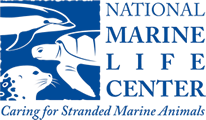Junior Tech Workshops Engage, Excite, and (dare we say it?) Educate

This February Vacation Week, we welcomed nine students from throughout Barnstable and Plymouth counties to participate in “Turtle T.L.C. & Seal S.O.S.” Created with Jr. TECH, a program of the Cape Cod Technology Council, the workshop aims to promote “STEM” skills while teaching kids about marine animal rehabililitation.

STEM stands for “Science, Technology, Engineering, and Math” and the National Marine Life Center partners with Jr. TECH and other organizations to incorporate these important skills in our education programs.

Students this week learned about marine animals, strandings, and rehabilitation. They fed “squid” to “sea turtles” and calculated grams “eaten”. they conducted an experiment on waters of different salinities to see when ice would form. They analyzed medical data to determine which “sea turtle” would receive a satellite tag. They tried to “eat” M&Ms® and Skittles® when “entangled.” (The quotes are around words/ideas that were simulated through various hands-on exercises and activities. There was no exposure to live animals during the workshop.)

Students played Marine Animal Twister and Marine Animal Concentration and Marine Animal Jeopardy. They laughed and learned and also shared great ideas with us, their instructors.

You can join us for two new Junior Tech workshops during April Vacation Week!
Discover Dolphins! will be held Monday, April 19 to Wednesday, April 21 from 1:00 to 4:00 pm at the National Marine Life Center. Geared towards grades 6 and 7, in this workshop we will take a journey around the world (in only three days!) to discover all the different species of dolphin, winding up on an in-depth exploration of the dolphins that inhabit the waters off Cape Cod. We will investigate dolphin anatomy and physiology, and explore the adaptations dolphins employ to survive as a mammal in the harsh environment of the ocean. Join us and discover everything you could ever want to know about dolphins! Please note that there is no exposure to live animals. The price is $99. Click here to register online.
Why’d they do that? Investigations of marine animal behavior! will be held Wednesday, April 21 to Friday, April 23, 2010 from 9:00 am to 12:00 noon at the National Marine Life Center. Geared towards grades 7 and 8, in this workshop we will ask questions such as: Why do whales breach? Do sea turtles hang out together? Why does a seal play dead? Do dolphins play? Did you every wonder why marine animals behave in certain ways? Compare and contrast behavioral strategies of different marine animal species. Learn principles of animal behavior including focal animal sampling and group or scan sampling. Discover how scientists use satellite telemetry to study animal movement. Investigate animals in the wild aboard a whale watch with Capt. John Boats on the last day! Friday’s whale watch location and time will be provided during the workshop. The price is $115. Click here to register online.






